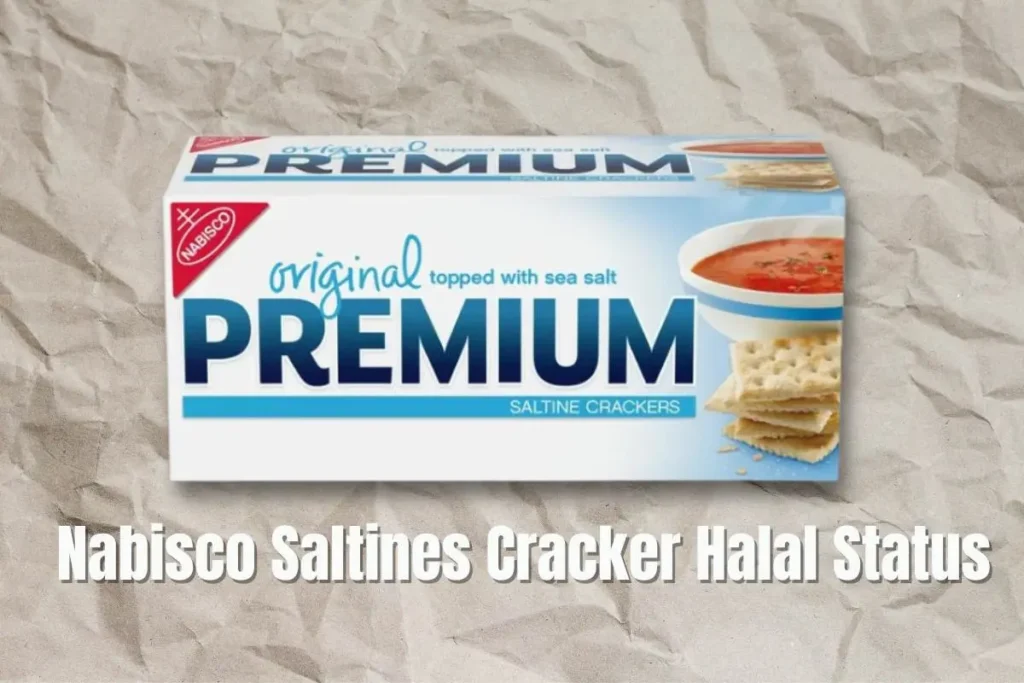Saltines are a type of thin, crisp, baked crackers that are popular as a snack or a soup accompaniment. But are saltines halal? The answer is not straightforward, as it depends on the ingredients, the manufacturing process, and the certification of the product.
Today, we will explore what saltines are, what flavors they come in, what ingredients they contain, and whether they are halal or not according to Islamic dietary laws.
Key Takeaways
| 📌 Saltine crackers are generally considered halal, with the main ingredients such as wheat flour, yeast, baking soda, salt, and oil or shortening being permissible. |
| 📌 While not mandatory, a halal certificate from a reputable halal authority adds assurance regarding compliance. |
What is Saltines?
Saltines, also known as soda crackers or saltine crackers, are a type of cracker that originated in the United States in the late 19th century. They are made from wheat flour, yeast, baking soda, salt, and sometimes oil or shortening.
They have a distinctive square shape, with perforations and scalloped edges. They are usually sprinkled with coarse salt on the top, giving them a salty flavor and a crunchy texture.
Saltines are often eaten as a snack, either plain or with toppings such as cheese, peanut butter, or jam. They are also commonly served with soups, stews, salads, or chili, as they can absorb the liquid and add some crunch.
Saltines are also used as an ingredient in some recipes, such as casseroles, meatloaves, or desserts.
Saltines Flavors
Saltines come in various flavors, depending on the brand and the region. Some of the most common flavors are:
- Original: The classic saltine cracker, with a simple and salty taste.
- Unsalted: A saltine cracker without any salt on the top, for those who prefer a less salty snack or have dietary restrictions.
- Whole Wheat: A saltine cracker made with whole wheat flour, which adds some fiber and nuttiness to the cracker.
- Cheese: A saltine cracker with cheese flavoring, either natural or artificial, added to the dough or the topping.
- Butter: A saltine cracker with butter flavoring, either natural or artificial, added to the dough or the topping.
- Garlic: A saltine cracker with garlic flavoring, either natural or artificial, added to the dough or the topping.
- Onion: A saltine cracker with onion flavoring, either natural or artificial, added to the dough or the topping.
- Herb: A saltine cracker with herb flavoring, such as oregano, basil, or rosemary, added to the dough or the topping.
- Multigrain: A saltine cracker made with a blend of different grains, such as oats, barley, rye, or quinoa, which adds some texture and variety to the cracker.
Saltines Ingredients
The ingredients of saltines may vary depending on the brand and the flavor, but the basic ingredients are usually the same. Here is a list of the typical ingredients of saltines, along with their explanations:
- Wheat Flour: The main ingredient of saltines, which provides the structure and the starch of the cracker. Wheat flour is made from grinding wheat kernels into a fine powder. Wheat flour is halal, as it is a plant-based product that does not contain any animal-derived or alcohol-based substances.
- Yeast: A leavening agent that helps the dough rise and creates air bubbles in the cracker. Yeast is a type of fungus that feeds on sugar and produces carbon dioxide and alcohol as by-products. Yeast is halal, as it is a microorganism that does not have a soul or a blood system, and the amount of alcohol it produces is negligible and evaporates during baking.
- Baking Soda: Another leavening agent that reacts with acid and creates carbon dioxide and water as by-products. Baking soda is also known as sodium bicarbonate, which is a chemical compound that is derived from natural minerals. Baking soda is halal, as it is a mineral-based product that does not contain any animal-derived or alcohol-based substances.
- Salt: A seasoning that enhances the flavor and preserves the freshness of the cracker. Salt is also known as sodium chloride, which is a chemical compound that is derived from natural minerals. Salt is halal, as it is a mineral-based product that does not contain any animal-derived or alcohol-based substances.
- Oil or Shortening: A fat that adds moisture and richness to the cracker. Oil or shortening can be derived from various sources, such as vegetable, animal, or synthetic. Oil or shortening is halal, as long as it is derived from a halal source, such as vegetable oil, and does not contain any haram ingredients, such as pork fat or alcohol.
- Flavorings: Additional ingredients that add taste and aroma to the cracker. Flavorings can be natural or artificial and can be derived from various sources, such as plants, animals, or synthetic. Flavorings are halal, as long as they are derived from a halal source, such as cheese, garlic, or herbs, and do not contain any haram ingredients, such as pork, alcohol, or insects.
Does Saltines Contain Haram Ingredients?
Haram is an Arabic word that means forbidden or unlawful in Islam. Haram ingredients are those that are prohibited by Islamic dietary laws, also known as sharia law. Some of the haram ingredients are:
- Pork and its derivatives: Pork is the meat of pigs, which are considered impure and unclean animals in Islam. Pork and its derivatives, such as bacon, ham, lard, gelatin, or enzymes, are haram, as they are derived from a haram source.
- Alcohol and its derivatives: Alcohol is a psychoactive substance that intoxicates and alters the mind. Alcohol and its derivatives, such as ethanol, methanol, or vinegar, are haram, as they are derived from a haram source or process.
- Carnivorous animals and their derivatives: Carnivorous animals are those that feed on the flesh of other animals, such as dogs, cats, lions, or bears. Carnivorous animals and their derivatives, such as meat, blood, or bones, are haram, as they are derived from a haram source.
- Blood and its derivatives: Blood is the fluid that circulates in the body of animals, carrying oxygen and nutrients. Blood and its derivatives, such as plasma, serum, or hemoglobin, are haram, as they are derived from a haram source.
- Dead animals and their derivatives: Dead animals are those that die without being slaughtered in the name of Allah, such as by natural causes, accidents, or predators. Dead animals and their derivatives, such as meat, skin, or fur, are haram, as they are derived from a haram source.
- Insects and their derivatives: Insects are small, winged, or legged creatures, such as ants, bees, or flies. Insects and their derivatives, such as honey, wax, or silk, are haram, as they are derived from a haram source.
Does saltines contain any of these haram ingredients? The answer is it depends on the brand and the flavor of the saltines. Some saltines may contain haram ingredients, such as pork fat, alcohol, or insect-derived colorings, while others may not.
Therefore, it is important to check the label and the ingredient list of the saltines before buying or consuming them.
Does Saltines Have a Halal Certificate?
A halal certificate is a document that certifies that a product or a service is halal, meaning that it complies with the Islamic dietary laws and standards. A halal certificate is issued by a halal authority, which is a recognized and reputable organization that inspects, audits, and verifies the halal status of a product or a service.
A halal certificate usually contains the name and the logo of the halal authority, the name and the description of the product or the service, the date and the validity of the certificate, and the signature and the seal of the halal authority.
Does saltines have a halal certificate? The answer is not necessary, as not all saltines are certified halal by a halal authority. Some saltines may have a halal certificate, while others may not.
You may also like:
Is Keebler Elves Halal? What You Need To Know
Is Keebler Wheatables Halal?
Are Saltines Halal or Haram?
The answer is it depends, as not all saltines are the same. Some saltines may be halal, while others may not. Therefore, it is important to consider the following factors when determining the halal status of saltines:
- The ingredients: The ingredients of saltines should be halal, meaning that they should not contain any haram ingredients, such as pork, alcohol, or insects. The ingredients should be derived from a halal source, such as vegetables, and should not be contaminated or mixed with any haram substances, such as blood or urine.
- The manufacturing process: The manufacturing process of saltines should be halal, meaning that it should not involve any haram methods, such as using haram equipment, utensils, or containers, or using haram additives, preservatives, or stabilizers. The manufacturing process should also be supervised and monitored by a halal authority, who can ensure the compliance and the quality of the product.
- The certification: The certification of saltines should be halal, meaning that it should be issued by a halal authority, who can attest and verify the halal status of the product. The certification should be valid and up-to-date and should be clearly
Allahu A’lam (Allah Knows Best)
FAQ
Are saltine crackers halal?
Saltine crackers are generally considered halal. There are no known haram ingredients in saltine crackers. However, it’s always important to check the ingredients list on the packaging to ensure that the product is halal-compliant.
Are saltine crackers vegetarian?
Saltine crackers are generally considered vegetarian as they typically contain plant-based ingredients such as flour, baking soda, salt, oil, and yeast.
Most saltine cracker brands do not include animal-derived products in their ingredients, making them suitable for a vegetarian diet.
Are saltine crackers kosher?
Saltine crackers can be kosher, and there are kosher-certified brands available in the market. Some kosher-certified saltine cracker brands include Lieber’s Kosher Original Style Saltines and Manischewitz Saltine Crackers.
It’s always advisable to check the packaging for kosher certification symbols to ensure that the product is kosher-compliant.
- Is Pop Tarts Halal? What You Need to Know - February 18, 2024
- Are Graham Crackers Halal in Islam? - January 19, 2024
- Is Keebler Wheatables Halal? - January 18, 2024





